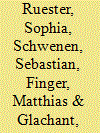| Srl | Item |
| 1 |
ID:
112253


|
|
|
|
|
| Publication |
2012.
|
| Summary/Abstract |
Achieving climate policy goals requires mobilizing public funds to bring still immature clean technologies to competitiveness and create new technological options. The format of direct public support must be tailored to the characteristics of technologies addressed. Based on the experience accumulated with innovation programs, we have identified those features of innovation that should directly condition the choice of direct support instruments. These include the funding gap between the cost of innovation activities and the amount of private funds leveraged; the ability of technologies targeted to compete for public funds in the market; the probability that these technologies fail to reach the market; and the type of entity best suited to conduct these activities.
Clean innovation features are matched to those of direct support instruments to provide recommendations on the use to be made of each type of instrument. Given the large financing gap of most clean energy innovation projects, public grants and contracts should finance a large part of clean pre-deployment innovation. However, public loans, equity investments, prizes and tax credits or rebates can successfully support certain innovation processes at a lower public cost. Principles derived are applied to identify the instrument best suited to a case example.
|
|
|
|
|
|
|
|
|
|
|
|
|
|
|
|
| 2 |
ID:
127900


|
|
|
|
|
| Publication |
2014.
|
| Summary/Abstract |
With the European Strategic Energy Technology Plan (SET Plan) expiring in 2020, the EU needs to revisit its energy technology policy for the post-2020 horizon and to establish a policy framework that fosters the achievement of ambitious EU commitments for decarbonization by 2050. We discuss options for a post-2020 EU energy technology policy, taking account of uncertain technology developments, uncertain carbon prices and the highly competitive global market for energy technologies. We propose a revised SET Plan that enables policy makers to be pro-active in pushing innovation in promising technologies, no matter what policy context will be realized in the future. In particular, a revised SET Plan should include a more technology-specific focus, provide the basis for planning and prioritization among decarbonization technologies, and should be based on a comprehensive approach across sectors. Selected technology targets and EU funding of innovation should be in line with the SET Plan prioritization.
|
|
|
|
|
|
|
|
|
|
|
|
|
|
|
|